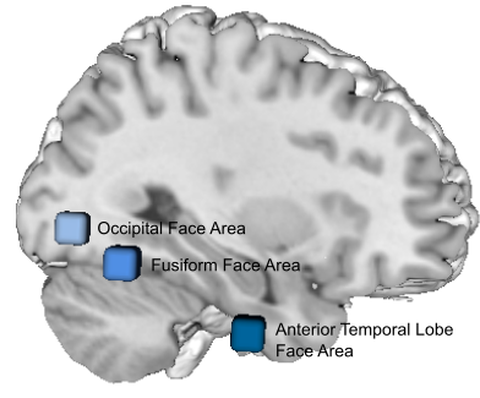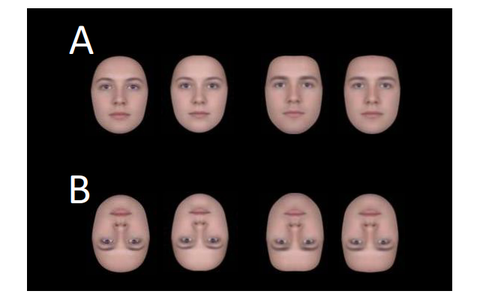Prosopagnosie
What is developmental prosopagnosia?
Interested in study participation?
Welcome To Our Prosopagnosia Website
Prosopagnosia refers to the difficulty in recognising other people from their faces. Most people with prosopagnosia do not initially know that they have difficulty with face recognition. They often learn of this diagnosis by accident, through reports in the media, or by researching on the internet.
On this website, we have put together some information about prosopagnosia. You can download our information sheet on developmental prosopagnosia here.
Participation in our study on developmental prosopagnosia is currently closed.
However, if you have any questions, please send us an email at and you will receive an automatic response with further information.
What Is Developmental Prosopagnosia?
People with developmental prosopagnosia have difficulty recognising other people by their face. This can happen even with very familiar faces including the faces of friends, family, or in some cases even the person’s own face may not be recognised. Individuals with the disorder have otherwise normal general visual and memory abilities.
It is estimated that 1 in every 40 people has developmental prosopagnosia [1 – 3].
What Does It Feel Like To Be Prosopagnosic?
The following picture can give you an idea of what it is like to be prosopagnosic. When looking at sequence A, it is generally clear that different faces are shown here. In contrast, distinguishing the faces in the sequence under B is more difficult. For people with prosopagnosia, recognising faces in sequence A causes as much difficulty as sequence B does for people without prosopagnosia.
Most of the time, people with developmental prosopagnosia can recognise individual features of the face, such as the eyes, nose, or lips. Gender or age can also be recognised from the face. The major difficulty lies in recognising the identity of the face – ‘who’ the person is. This can lead to feeling uncomfortable in social situations for instance at parties with large groups of people, because it is difficult to recognise them.
Many of our study participants report that they frequently experience uncomfortable situations in their everyday social and working life because of this difficulty in recognising faces. For example, one participant reported:
"I have been struggling to distinguish and remember faces since I was a child. I'm a teacher and I do not recognise parents on the open street with whom I had a parent interview the day before. I remember the children's names in the class by the seating plan or by hair colour. I can manage it and get by. But I've always been terribly embarrassed in interactions with parents and I've never been able to explain it to myself. I have often been afraid that the people around me think they don't matter to me. I first read 3 years ago that there was such a perception disorder, and it made me prick up my ears. I now often apologise for it right away in the first parent-teacher conferences and make an effort to be open about it."
Affected persons often use additional information to identify others, including hairstyle, voice, or clothing.
People with developmental prosopagnosia include celebrities like behavioural scientist Jane Goodall, the late neurologist and author Oliver Sacks, actor Brad Pitt, and Crown Princess Victoria of Sweden, who all reported that they suffer from an inability to recognise faces [8 - 9].
Carlotta, a prosopagnosic, also cannot recognise her own face in the mirror. She uses her hands to form a tactile representation of her face, scanning it with her hands she can create self-portraits. An insight into Carlotta's world without faces has been impressively captured by scientist Valentin Riedl and artist Frédéric Schuld in the short film "Carlotta's Face”.
Reports such as this help to raise public awareness about the existence of the perceptual disorder prosopagnosia. Increasing public awareness of face blindness and showing affected individuals that they are not alone with their impairment, may help many to better understand themselves and cope with this deficit. A prospective participant wrote:
"I found out some time ago that I suffer from prosopagnosia. Since knowing this, I unexpectedly feel much more liberated and less "weird" than other people, as this lack of face recognition has puzzled me a lot since childhood. And I don't mind that there is no cure or therapy, but now at least my "problem" has a name.”
What Causes Developmental Prosopagnosia?
The exact cause of developmental prosopagnosia is not clearly understood. However, often multiple members of the same family are affected, suggesting there may be a genetic component [4 - 7]

Bildliche Darstellung der Gehirnregionen, die an der Gesichtserkennung beteiligt sind.
There are multiple regions in our brain that support face identification. However, it is still unclear how these brain regions function in people with developmental prosopagnosia. In our study, we are interested in exploring these regions.
Interested?
Do you have developmental prosopagnosia, or do you feel that the description of developmental prosopagnosia applies to you?
Participation in our developmental prosopagnosia study is currently closed.
However, if you have any questions, please send us an email at and you will receive an automatic response with further information.
PDF-Download: Data privacy policy and consent form for participation in the MRI study
Media and Websites about Prosopagnosia
Information sheet about prosopagnosia
HR TV-Beitrag zu Prosopagnosie
Current Study Team and Project Staff
|
Dr. Corrina Maguinness Principal investigator |
Prof. Dr. med. Head of department |
Aline Eichhammer Medical doctoral student |
|
Differential diagnostics |
Sofia Meyer Medical doctoral student |
Recruitment and diagnostics |
References
1. Grüter, T., M. Grüter, and C.-C. Carbon, Neural and genetic foundations of face recognition and prosopagnosia. Journal of Neuropsychology, 2008. 2(1): p. 79-97.
3. Rivolta D. (2014) Stories from People Who Share Their Lives with Congenital Prosopagnosia. In: Prosopagnosia. Cognitive Systems Monographs, vol 20. Springer, Berlin, Heidelberg
4. Kennerknecht, I., N.Y. Ho, and V.C.N. Wong, Prevalence of hereditary prosopagnosia (HPA) in Hong Kong Chinese population. American Journal of Medical Genetics. Part A, 2008. 146A(22): p. 2863-2870.
5. Grueter, M., et al., Hereditary prosopagnosia: The first case series. Cortex; a journal devoted to the study of the nervous system and behavior, 2007. 43(6): p. 734-749.
6. Lee, Y., et al., Three cases of developmental prosopagnosia from one family: Detailed neuropsychological and psychophysical investigation of face processing. Cortex, 2010. 46(8): p. 949-964.
7. Duchaine, B., L. Germine, and K. Nakayama, Family resemblance: ten family members with prosopagnosia and within-class object agnosia. Cognitive Neuropsychology, 2007. 24(4): p. 419-430.
8. Does Brad Pitt suffer from face blindness?, CNN
9. Face-Blind by Oliver Sacks, the New Yorker



